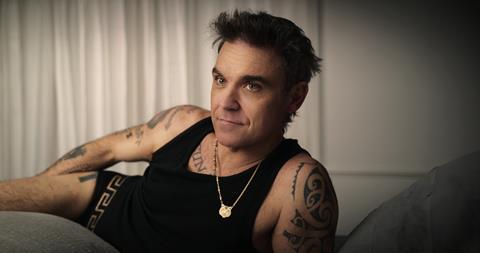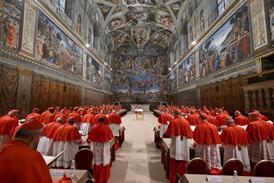“A tender portrait of a genuine British sensation”

Robbie Williams, Netflix
“It would be easy to make a joke about a bloke from the Potteries being a bit fragile, but Robbie Williams is a tender portrait of a genuine British sensation. Admittedly, it may end up just another instalment in Netflix’s hagiographic portraits of English icons, from David Beckham and Tyson Fury to George Michael and Keith Richards, but its attempt at self-examination, if a little arch, is an effective way of looking at the excesses and intrusions of celebrity at the turn of the millennium.”
Nick Hilton, The Independent
“It revealed a fragile young man being slowly broken on fame’s wheel until he collapsed, addicted to alcohol, drugs, cigarettes, approval. At the risk of sounding like a rubber-necking voyeur, it is fascinating.”
Carol Midgley, The Times
“The clips are well-chosen, capturing the craziness of fame and the star’s mental unravelling. Williams is articulate and thoughtful. But the format has an anaesthetised quality. The endless shots of Williams pacing around his house, or his face bathed in the glow of a laptop screen, are deadening. It plays out like an extended therapy session. Still, it’s an insight into the many downsides of fame, from jealousy of bandmates to the relentless touring and promotional schedule.”
Anita Singh, The Telegraph
“The four-part series takes on a strange format, with Williams, now 49, settling down in bed wearing a black vest, black underpants and an array of necklaces to rake over his past. There are no other interviews or talking heads throughout the series (aside from a few snippets of insight from Williams’s wife of 13 years, Ayda Field, in the final episode), giving the films an intimate feel yet also curiously limited scope.”
Emily Baker, The i
“Fame’s psychological ill-effects are patently not funny, and Robbie Williams is more evidence that celebrity is an affliction and an addiction, which in turn leaves the series feeling like an opportunity to rubberneck at disaster. At the same time, Williams is so hard to empathise with. It turns out it’s surprisingly tricky to emotionally connect with someone when all you see is them – as this myopic documentary has proven to its own detriment.”
Rachel Aroesti, The Guardian
“It was, in its own way, gently revealing. However, one does worry after all these recent profiles of Beckham, Arnie, Sly Stallone and co, whether the interviewees are the ones who increasingly hold the power over their telly quizmasters nowadays.”
Ben Dowell, The Times
“Mainly it was charming knockabout stuff. Theroux looked genuinely embarrassed asking tabloid-y questions about girlfriends, and whose toes didn’t curl when he had a stab at matching Joshua’s rap with his own?”
Jasper Rees, The Telegraph
“While the first episode of Louis Theroux Interviews… series two was an enjoyable hour of television, it couldn’t claim to reveal much that is new, noteworthy or groundbreaking about one of boxing’s biggest stars. Save for a few notable moments where we get a glimpse of vulnerability, of a conflicted man, the boxer’s guard stays up, and I was left wishing we could find out more.”
Alex Dakers, The i
“With more autonomy (the production company, Mindhouse, run by Theroux and his wife, Nancy Strang, now make his projects) and a less constrictive format, The Louis Theroux Interviews are undoubtedly more entertaining than the usual celebrity interview racket. But this series has far more in common with the world of pro-wrestling than that of boxing. For all his dynamism, intellectual contortion, and sheer, expressive joy of the pursuit, it’s all too rare that Theroux manages to lay a glove on the personalities before him.”
Nick Hilton, The Independent
The Buccaneers, Apple TV+
“It is The Gilded Age if Julian Fellowes had been able to channel the wit of Edith Wharton – or anyone – and inject it with modern flair and keep the whole thing effervescent and charming without becoming vapid, which is exactly the feat creator Katherine Jakeways has pulled off. Of course it’s nonsense, in the sense that there is no slavish attention to period detail. But we are allowed some nonsense now and again, and there is nothing more joyfully restorative than when it is done as well as it is here.”
Lucy Mangan, The Guardian
“Purists might recoil at the soundtrack, the slang and the sexiness, but all in all this is a fabulous way to reintroduce Wharton to the world. Especially when compared to Julian Fellowes’s lavish but dreadfully dull The Gilded Age, here is a period drama that has managed to hit the sweet spot between modern whimsy and actual intellect.”
Poppie Platt, The Telegraph





























No comments yet